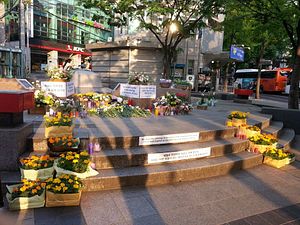As new revelations reveal how poor oversight by regulatory bodies contributed to the Sewol ferry disaster, the growing public outrage has prompted the Park Geun-hye administration to make drastic changes to the structure of several government bodies and the regulations guiding their activities. In addition to putting the South Korean Coast Guard on the chopping board, the government has made eliminating the “Gwan-fia” (관피아) a major policy objective in the coming months.
This new buzzword is a portmanteau of gwanryo (bureaucrat) and mafia, describing the endemic collusion between government officials and business. In particular, analysts are pointing to the alarmingly common practice of high-ranking South Korean government officials acquiring senior positions in the private sector as the epicenter of this malaise. The concern raised here is that officials responsible for public safety are neglecting their duties because of the implicit and or explicit understanding that they would be rewarded for acquiescing to private-sector demands by receiving extremely lucrative positions in the private sector that they were supposed to regulate after they retire from public service. In turn, former bureaucrats in private enterprises are well placed to apply pressure and lobby their old government office on behalf of their new patrons to further curb oversight, perpetuating the problem indefinitely.
Although a perennial problem in South Korea, the issue over the “Gwan-fia” has captured the public’s attention in the aftermath of the ferry disaster because the collusion between public officials and private enterprises has so clearly played a role in the tragedy. For instance, the Korea Shipping Association (Haewoon) was contracted by the South Korean government to ensure that ships are operating in accordance with safety regulations. However, the sinking of the ferry Sewol revealed that Haewoon had not been properly overseeing whether ships were carrying cargo within their capacity or keeping an accurate account of the number of passengers onboard, all issues that exacerbated the accident and the botched rescue effort that followed. More shockingly, there appears to have been little cross-checking by government bodies to ascertain the quality of Haewoon’s operations.
While this might appear at first to be a simple case of fatal incompetence, a closer look reveals that there appears to have been serious collusion between government officials and Haewoon. According to an investigative report by the Korea Broadcasting Service (KBS) on May 23, of the twelve individuals who have served as the chairman of the board of directors at Haewoon, ten had previously held senior positions in major government bodies, including the Ministry of Oceans and Fisheries. A similar case can also be found in the Korea Register of Shipping, the body that approved the refitting of the Sewol with more cabin space, which ultimately made the ship more prone to tipping over.
Investigation into this phenomenon of cyclical corruption is long overdue in South Korea. While previous administrations were able to pass the buck on this issue, public ire over the neglect of public safety has made it a problem the current government cannot ignore.
Given the mood of the country, the National Assembly has already begun drafting new legislation that would impose severe punishments on former government officials engaged in lobbying or other similar activities that take advantage of their network in the public sector for private gain. However, bickering over the details of the legislation has already begun, and the debate is expected to be protracted.
At the same time, as commentators on Joongang Tongyang Broadcasting Company (JTBC) have rightly noted, the newly proposed legislation says nothing about how the government will ensure that the officials overseeing transparency in the public sector will themselves remain free from collusion with the private sector.
The problem is clearly deeply ingrained in the political culture of South Korea – a sign that the county is still experiencing growing pains from its spectacular economic transformation over the past six decades.
































